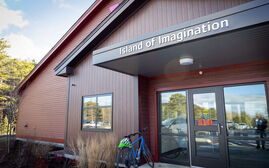
Jackson Lab looks to adapt to proposed cuts in NIH funding
 File photo / Courtesy Jackson Laboratory
Jackson Laboratory, headquartered in Bar Harbor, could see a 60% cut in funding from the NIH.
File photo / Courtesy Jackson Laboratory
Jackson Laboratory, headquartered in Bar Harbor, could see a 60% cut in funding from the NIH.
Biomedical research momentum and even the ability to cultivate the next generation of researchers are at risk if proposed budget cuts at the National Institutes of Health move forward, the director of one of Maine's top research institutions said.
Lon Cardon, the president and CEO of Bar Harbor-based Jackson Laboratory, said the lab is looking at ways to adapt to an uncertain federal funding and policy landscape, including business opportunities and a merger designed to accelerate the discovery of disease treatments.
‘In trouble’
If proposed funding cuts at the NIH go through, “we’re in trouble, as is the state of science in America,” Cardon said during a “state of the lab” presentation in July.

Cardon said the lab gets roughly $100 million annually for research from the National Institutes of Health. The sum is virtually all of the lab’s research funding, he said.
A 40% cut is proposed in the National Institutes of Health’s fiscal year 2026 budget. And a 15% cap has been proposed on the amount of reimbursement research institutions can get for indirect costs that support research, such as lab space, services and supplies.
If the cuts go through as proposed, he said, it would wipe out $60 million per year in JAX’s research funding.
“JAX and most other research institutions will be at best much smaller than they are today, and some won’t exist,” he said. “You can’t recover from that.”
Stalled momentum
The lab has been implementing cost-saving measures, such as giving up travel and conferences, he said. But every staff member so far has been retained.
“We have thus far weathered better than others,” he said.
Cardon warned the funding cuts could mean losing the next generation of scientists, if students decide not to enter the field or go to other countries.
It could also stall momentum on basic research and drug discoveries such as cancer therapies, he continued.
“You can’t just stop and start science,” he said. “It has to continue all the way through” or the findings will get lost.
To keep the momentum going, he said, the lab would be looking toward philanthropy, as well as business opportunities such as providing services to the pharmaceutical industry and generally expanding partnerships within the industry into business relationships.
Merger
Cardon announced the merger of JAX with the nonprofit New York Stem Cell Foundation, which is expected to leverage both organizations’ strengths in biomedical data science.
Jackson Laboratory will assume the foundation’s operations and assets, subject to approval by the New York Attorney General.
The merger will integrate JAX’s expertise in genomics and disease modeling with the foundation’s expertise in stem cell technologies and AI-driven biomedical analytics.
The goal is to accelerate the discovery of disease therapies and cures.
A cornerstone of the alliance is called the NYSCF Global Stem Cell Array, a robotic platform that automates the creation of patient-specific stem cells in order to understand disease and testing treatments.
The partnership will immediately expand efforts in areas such as Alzheimer’s and Parkinson’s diseases, cancer, diabetes, rare diseases and diseases of the eye, according to a news release.
The combined organization will be managed from Jackson Laboratory’s headquarters in Bar Harbor. The foundation’s research facility in Manhattan, provisionally named the JAX-NYSCF Collaborative, will continue operations as a site within JAX’s network of campuses in Maine, Connecticut, California, Florida and Japan.












0 Comments